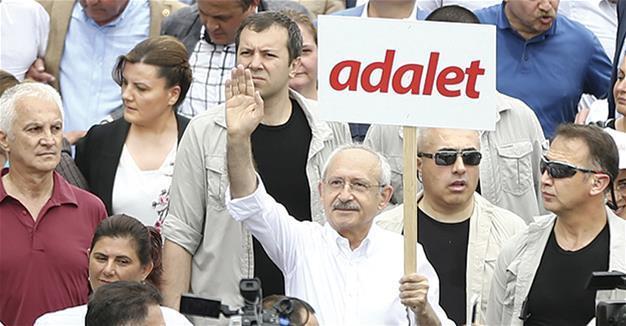Main opposition CHP’s ‘justice congress’ launches in Çanakkale
ANKARA

The main opposition Republican People’s Party (CHP) on Aug. 26 launches its “Justice Congress” in the western province of Çanakkale, planning to hold workshops, panels and discussions on Turkey’s poor current justice record.
The congress will bring together more than 700 speakers in eight main panels and 70 workshops until Aug. 30 at Çanakkale’s historic Kocatepe field. It comes after the 450-kilometer “justice march” from Ankara to Istanbul organized earlier in the summer by the CHP.
CHP leader Kemal Kılıçdaroğlu will address participants at the start of the congress, which he will attend for the remaining four days.
At the event there will be eight main panels on justice in courts, daily life, education, religion, media, election and livelihood. The first topic to be discussed at the congress will be “justice in courts.”
Panelists from different political backgrounds
The list of panelists included academics, writers and politics from a range of political backgrounds including former Justice and Development Party (AKP) lawmaker Ertuğrul Yalçınbayır, Kurdish issue-focused Peoples’ Democratic Party (HDP) lawmaker Levent Tüzel, former Nationalist Movement Party (MHP) lawmaker Gürcan Dağdaş, Marxist political economist Prof. Dr Korkut Boratav, dismissed law scholar Prof. Dr. İbrahim Kaboğlu, and former minister Yüksel Yalova.
‘Memory street’
The site of the congress will also include a “Memory street” dedicated to around 200 murders, assassinations and attacks that have marked Turkey’s history. Photographs and personal stories will be described on the street, which will start with the killing of writer Sabahattin Ali.
The Sivas Massacre carried out by Islamist fundamentalists on July 2, 1993, the Başbağlar Massacre carried out by the PKK on July 5, 1993, and the execution of 17-year-old Erdal Eren and ultranationalist Mustafa Pehlivanlı after the 1980 military coup will be marked on the street. The street will also feature the assassination of Kurdish dissident and writer Musa Anter as well as unidentified murders of 1990s.
CHP Malatya deputy Veli Ağbaba, who is responsible for the organization of the street, said it aimed to focus on “injustices in our history.”
“With the street, we are trying to say that pain has no religious or political ideology. Sorrows bring us together, they don’t divide us,” Ağbaba said.
“We will face the shared pains so we will never live them again. Sorrows have no left or right,” he added.
‘Zero tolerance for hate speech’
During the panels at the congress, the panelists and speakers who were already determined will speak first.
“The speeches will be drawn up by international standards of freedom of thought,” reads the 12-article declaration of basic principles.
Accordingly, speakers will not be able to praise terrorism, violence or crime, and they will also not be allowed to use hate speech. In the event that these rules are violated, the speeches will be cut.
Similar to the “justice march,” the congress will also not allow any political party flags or banners, with only Turkish flags being allowed to be displayed.
 The main opposition Republican People’s Party (CHP) on Aug. 26 launches its “Justice Congress” in the western province of Çanakkale, planning to hold workshops, panels and discussions on Turkey’s poor current justice record.
The main opposition Republican People’s Party (CHP) on Aug. 26 launches its “Justice Congress” in the western province of Çanakkale, planning to hold workshops, panels and discussions on Turkey’s poor current justice record.